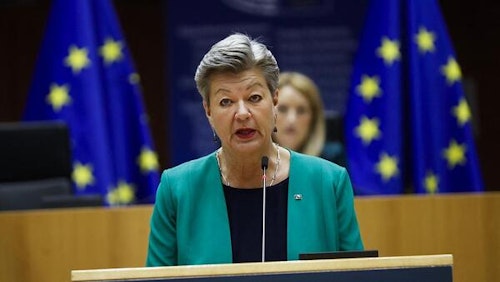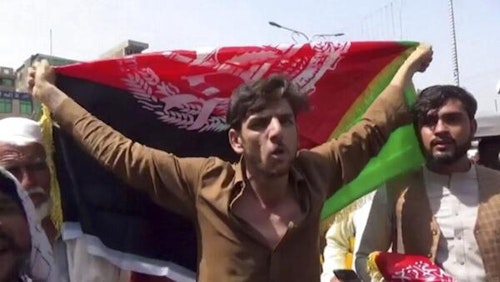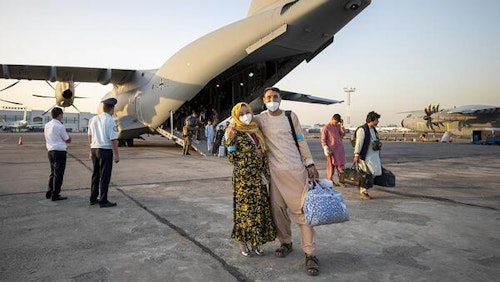An anti-Taliban protest was violently broken up in the east on Wednesday, while Western evacuations continued from Kabul. Afghanistan's ousted President Ghani has addressed his people from the United Arab Emirates.
Exiled Afghan President Ashraf Ghani on Wednesday defended his decision to leave Kabul as the Taliban advanced and eventually toppled his government.
He claimed that he was "forced to leave Afghanistan with one set of traditional clothes, a vest and the sandals I was wearing." Ghani left Afghanistan on Sunday just as the Taliban approached Kabul.
In a video posted on his Facebok page, Ghani also confirmed that he was in the United Arab Emirates, which said it had accepted him on "humanitarian grounds".
He said he was "in discussions" over a return to the country and supported the new dialogue between the Taliban and officials from the last government.
Meanwhile the European Commission has said EU member states must accept people from Afghanistan who are "in immediate danger"..
"Journalists, NGO staff and human rights advocates in Afghanistan are amongst those who are most at risk, women in particular," Home Affairs Commissioner Ylva Johansson said in a statement.
"We need to offer legal, safe and organised pathways towards the EU... I have called on Member States to step up their engagement on resettlement, to increase resettlement quotas to help those in need of international protection."
A summary of other key developments (see our blog below for the latest updates):
- The Taliban violently broke up a protest in eastern Afghanistan on Wednesday, killing at least one person as they quashed a rare public show of dissent.
- In Kabul thousands have been racing to the airport to be evacuated, and the country's borders to flee after the Taliban took back control of the capital earlier this week.
- The militant group has met with former officials from the toppled Western-backed government and former President Hamid Karzai. Top Taliban political leaders including co-founder Mullah Abdul Ghani Baradar have returned to the country from Qatar.
- The UK has said it will take in 20,000 refugees from Afghanistan over the next five years. The opposition accuses Johnson's government of complacency.
- The EU is suspending development payments to Afganistan, the bloc's top diplomat has said.
Latest updates:
Before returning to Afghanistan, Baradar and a Taliban delegation met with the Qatari Foreign Minister Mohammed bin Abdulrahman Al-Thani.
On Twitter, Al-Thani said they "discussed the necessity of reaching a comprehensive political settlement that achieves a peaceful transfer of power, preserves the gains made by the Afghan people, and heightens the desired stability in Afghanistan."
One of the major difficulties for any new government will be boosting the economy — one of the poorest in the world — as Western countries ponder cutting crucial development assistance to the country.
Last year, Afghanistan's gross domestic product (GDP) amounted to $19.81 billion (€16.9 billion), 42.9% of which came from international aid, according to World Bank data.
The Taliban's revenue over the past two decades has derived from the opium trade, other criminal activities including extortion and taxes it imposed over territories under their control.
One of the group's spokesperson said on Tuesday however that "Afghanistan will no longer be an opium-growing country" with production to return "to zero again", as it was when they last ruled the country.
He added that they would welcome foreign aid: "We have had exchanges with many countries. We want them to help us."
Josep Borrell, the European Union's top diplomat, told reporters on Tuesday evening that the bloc is suspending the €1.2 billion development assistance planned for Afghanistan over the 2021-2024 period. This followed a similar decision from Germany.
Borrell said the EU "will engage in a dialogue (with the Taliban) as soon as necessary to prevent a humanitarian and a potential migratory disaster." The EU said its humanitarian assistance will continue and may be increased.
The UK has also suggested it could reduce its development assistance to Afghanistan. Britain has allocated £93.8 million (€110 million) in aid to Afghanistan for the 2021/2022 period.
Humanitarian assistance is to be increased, Prime Minister Boris Johnson confirmed during a phone call with US President Joe Biden on Tuesday. The country also plans to take in 20,000 Afghan refugees over the coming years.
The White House said in its own readout of the call that the two leaders "agreed on the need for close coordination with allies about the future of aid and support to Afghanistan now that the Taliban is in charge" and that they "agreed to hold a virtual G7 leaders' meeting next week to discuss a common strategy and approach."
Johnson, meanwhile, also held calls with French President Emmanuel Macron and German Chancellor Angela Merkel.
Merkel and Macron have already been in contact over the developments in Afghanistan, notably to coordinate efforts to push for a common EU migration policy. The German leader also discussed the issue with her Italian counterpart, Matteo Draghi.
Italy, alongside Greece, Spain and the Western Balkans, is one of the major routes into the EU for migrants.
Draghi said the G20, of which Italy currently holds the presidency, is "the natural" forum to launch a process of collaboration among countries including China, Russia, Saudi Arabia and Turkey, in addition to Europe.
"The future for Italy is made up by the defense of fundamental rights, the defense of the rights of women and the protection of all those who exposed themselves in these years to defend these rights in Afghanistan. This must be undertaken in all possible contexts," he said.
A G20 ministerial meeting is planned later this month dedicated to women.

 ${title}
${title}
Live ended
Watch euronews TV Live - Television live broadcast | Euronews
euronewsFollow the news live on euronews.com – Breaking news, latest news updates, international news, stay informedThird of UN foreign staff leaving Afghanistan
The United Nations says it's sending about a third of its 300 international staff in Afghanistan to Kazakhstan to work remotely on a temporary basis in light of “the volatile situation in the country.”
U.N. spokesman Stephane Dujarric announced on Wednesday that about 100 U.N. personnel were traveling from Kabul to Almaty, Kazakhstan’s largest city, to work in a temporary satellite office.
He said the majority of the U.N.’s humanitarian staff “remain in Afghanistan, providing vital assistance to millions most in need.”
Secretary-General Antonio Guterres told the U.N. Security Council on Monday following the Taliban takeover of the country that the U.N. is committed to staying in Afghanistan and helping millions of people, but he also said the 193-member world organization will adapt to the security situation.
“This is a temporary measure intended to enable the U.N. to keep delivering assistance to the people of Afghanistan with the minimum of disruption while at the same time reducing risk to U.N. personnel,” Dujarric said. “Personnel will return to Afghanistan as conditions permit.”
In addition to the international staff, the U.N. and its agencies have about 3,000 Afghan employees.
Dujarric said “a significant amount of work is being undertaken, as we speak, specifically to safeguard national staff.”
IMF says withholding funds from Afghanistan amid uncertainty
"As always, the IMF is guided by the views of the international community," a spokesperson told AFP. "There is currently a lack of clarity within the international community regarding the recognition of a government in Afghanistan, as a result of which the country cannot access SDRs (special drawing rights) or other IMF resources ".
EU states should 'take in people in immediate danger' in Afghanistan, says Brussels
Evacuations from Kabul 'hindered by Taliban' -- White House
Ousted president says he was 'forced' to flee country
Afghan President Ashraf Ghani on Wednesday defended his decision to leave Kabul as the Taliban advanced and eventually toppled his government.
In a video posted on his Facebook page, Ghani also confirmed that he was in the United Arab Emirates.
He thanked Afghan security forces in his message, but also said that the "failure of the peace process" led to the Taliban snatching power.
Ghani also indirectly tried to quash an accusation by Afghanistan's ambassador to Tajikistan that he had stolen $169 million from state funds.
He claimed that he was "forced to leave Afghanistan with one set of traditional clothes, a vest and the sandals I was wearing."
Ghani left Afghanistan on Sunday just as the Taliban approached Kabul.
On Wednesday, the United Arab Emirates said it had accepted him and his family on account of "humanitarian considerations."
Deadly attack by Taliban militants on protesters fuels fears over future rule
Ghani 'in discussions' over return to country
Exiled Afghan President Ashraf Ghani "speaks to the nation"
As a preamble to his message, posted on his Facebook account, Ghani explained that he would deal with "recent developments" in Afghanistan, which he fled last weekend as the Taliban regained power.
Emotional UK emergency debate ends
Taliban may kill us for working with 'infidels', says Afghan employed by EU mission
Taliban 'met with ex-Afghan president Karzai'
Taliban officials met with former Afghan President Hamid Karzai and former Vice President Abdullah Abdullah in Kabul on Wednesday, according to the Islamist monitoring group SITE.
Abdullah Abdullah was also the head of the High Council for National Reconciliation in failed negotiations in Qatar.
Taliban leaders "have said they forgive all former government officials, so there is no need for anyone to leave the country," the ISA said, after the Taliban released images of Hamid Karzai with Anas Haqqani, a member of the Taliban negotiators.
EU must welcome Afghans "in immediate danger" (European Commissioner)
At the same time, we cannot abandon people in immediate danger in Afghanistan. Journalists, NGO staff and human rights advocates in Afghanistan are amongst those who are most at risk, women in particular."
Greece mulls sending Afghan asylum seekers to Turkey
"No country can organise returns to Afghanistan," Notis Mitarachi told Skai television station. But he added: "We consider Turkey to be a safe country for Afghan citizens."
For months, Greece has tried unsuccessfully to persuade Turkey to take in 2,000 failed asylum seekers.
The minister said Greece's priority is to evacuate EU nationals and Afghans who have collaborated with Greek forces as part of NATO missions.
"The first priority is humanitarian ... We are discussing the evacuation of some families, (former) interpreters of the Greek army or people who have collaborated with us in any way", announced the minister.
But he insisted that Greece already hosts 40,000 Afghans and that the country will not become a new "gateway for illegal flows" after the 2015 wave of migration.
Taliban leaders meet former president Karzai and ex-government negotiator
Taliban leaders on Wednesday met with former Afghan president Hamid Karzai amid efforts by the Taliban to set up a government.
Karzai was joined by the former government's main peace envoy, Abdullah Abdullah.
It was the first sign of engagement between the Taliban the ousted government since the fall of Kabul last Sunday.
Anas Haqqani, a senior leader in a powerful Taliban faction, was seen sitting next to the former president in the meeting.
The U.S. branded the Haqqani network a terrorist group in 2012, and its involvement in a future government could trigger international sanctions.
The preliminary meeting was intended to facilitate eventual negotiations with Mullah Abdul Ghani Baradar, the top Taliban political leader, a spokesperson for Karzai said.
Evacuations continue from Kabul airport
- French airlift: 216 people expected in Paris after being evacuated overnight on Tuesday to a "safe place". They are made up of 184 Afghans "from civil society in need of protection", 25 French, 4 Dutch, one Irish and 2 Kenyans. On Tuesday, 41 French and foreign nationals were brought out.
- The UK has evacuated 306 Britons and 2,052 Afghans, "safely," Prime Minister Boris Johnson said on Wednesday.
- The US military has already evacuated more than 3,200 people, including US personnel, using military planes. In addition, nearly 2,000 Afghan refugees have been transported to the United States. The US plans to evacuate more than 30,000 people via its bases in Kuwait and Qatar.
- The German Defence Ministry said that it has successfully evacuated a further 180 people on Wednesday but provided no details about their nationalities. They were first airlifted to neighbouring Uzbekistan. This brings the total number of German evacuees to more than 400. Berlin accuses the Taliban of obstructing access to the airport for Afghans. Austria and Romania have reported similar problems.
- Spain has begun evacuations via Dubai, with a first military flight arriving in Kabul on Wednesday and two others on the way.
- The Netherlands evacuated its first nationals on Wednesday. Some were prevented from boarding on time by US soldiers. But an aircraft left Kabul with around 35 Dutch and Belgian, German and British nationals, en route to Tbilisi, according to the Dutch defence ministry.
- Poland evacuated 50 people to Uzbekistan, from where a civilian apparatus is to repatriate them. Two other military planes will continue the rotations. According to Polish Prime Minister Mateusz Morawiecki, NATO and the European Union have asked Warsaw to repatriate some of their employees.
- Norway has for its part repatriated 14 Norwegians and continues its operations.
- Elsewhere in Europe, repatriations of nationals or Afghans have already taken place since Monday in the Czech Republic, North Macedonia, Albania and Kosovo.
- Kazakhstan has also evacuated 42 people from Kabul.
British MP, an Afghanistan veteran, slams 'shameful' Biden
A conservative member of British parliament who served in both Afghanistan and Iraq on Wednesday said the Taliban's takeover has "torn open" wounds.
Tom Tugendhat made the comments as he delivered an emotional speech during an emergency session in the House of Commons on the rapidly evolving situation in Afghanistan.
"This last week has been one that has seen me struggle through anger and grief and rage", Tugendhat told the House.
Tugendhat said the events of the past week have been a "harsh lesson for all of us".
The MP and former army officer called on the UK's NATO allies "to make sure that we hold the line together".
Tugendhat criticized recent remarks made by US President Joe Biden and said it was "shameful" for him to "call into question the courage of men I fought with".
"Those who have not fought for the colours they fly should be careful about criticising those who have," Tugendhat said.
In an address to the nation on Monday, President Biden said "The Afghan military collapsed, sometimes without trying to fight."
"American troops cannot and should not be fighting in a war and dying in a war that Afghan forces are not willing to fight for themselves," Biden added.
NATO to hold emergency meeting on Friday
Stoltenberg has admitted that Atlantic alliance forces were surprised by Afghan authorities' rapid collapse, calling for lessons to be learned.
Afghan President Ashraf Ghani arrives in UAE
The United Arab Emirates announced Wednesday that it had welcomed Afghan President Ashraf Ghani and his family after his flight from the country which fell to the Taliban.
The Emirates "have welcomed Afghan President Ashraf Ghani and his family for humanitarian reasons," the official WAM news agency said, citing the Foreign Ministry.
Taliban violently disperse rare protest; 1 killed, 6 wounded
Dozens of people gathered in the eastern city of Jalalabad to raise the national flag a day before Afghanistan's Independence Day, which commemorates the end of British rule in 1919. They lowered the Taliban flag — a white banner with an Islamic inscription — that the militants have raised in the areas they captured.
Video footage later showed the Taliban firing into the air and attacking people with batons to disperse the crowd. Babrak Amirzada, a reporter for a local news agency, said he and a TV cameraman from another agency were beaten by the Taliban as they tried to cover the unrest.
A local health official said at least one person was killed and six wounded. The official was not authorized to speak to media and so spoke on condition of anonymity.
Germany evacuates a further 180 people
How has life changed in Kabul?
With the Taliban controlling Kabul, residents in the Afghan capital must now pass through a number of checkpoints to get around, including in the formally heavily secured green zone.
A local commander manning a checkpoint said that they were there to prevent looting and to secure embassies and property.
The Taliban has promised a new era of peace and security, saying they will forgive those who fought against them and grant women full rights under Islamic law, without elaborating.
But many Afghans are deeply sceptical of the group, especially those who remember its previous rule, when it imposed a harsh interpretation of Islamic law.
At that time, women were largely confined to their homes, television and music were banned, and suspected criminals were flogged, maimed or executed in public.
UK opposition leader accuses government of 'complacency'
UK to 'double' humanitarian commitment to Afghanistan
New Afghan regime must be judged by its actions, Johnson stresses
Johnson speaks to British MPs about Afghanistan
Taliban blow up statue of Shiite militia leader
The statue depicted a militia leader killed by the Taliban in 1996, when the Islamic militants seized power from rival warlords.
Abdul Ali Mazari was a champion of Afghanistan’s ethnic Hazara minority, Shiites who were persecuted under the Sunni Taliban’s earlier rule.
The statue stood in the central Bamyan province, where the Taliban infamously blew up two massive 1,500-year-old statues of Buddha carved into a mountain in 2001. The Taliban claimed the Buddhas violated Islam’s prohibition on idolatry.














